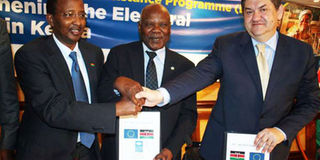IEBC to begin voter registration

From left: Independent Electoral and Boundaries Commission (IEBC) chairman Issack Hassan, United Nations Development Programme Resident Representative Michel Balima and EU Ambassador to Kenya Stefano Dejak at Norfolk Hotel in Nairobi on February 11, 2016, when the IEBC received funds for the 2017 elections. The voter registration campaign will run until March 15. PHOTO | ROBERT NGUGI | NATION MEDIA GROUP
What you need to know:
- The Kericho and Malindi posts fell vacant after President Uhuru Kenyatta appointed Mr Charles Keter and Mr Dan Kazungu Cabinet secretaries for Energy and Mining respectively.
- By law, the commission cannot continue with voter registration in the two electoral areas just before the by-elections.
The month-long countrywide mass voter registration starts Monday, at a time the electoral commission’s in-tray is overflowing.
Apart from the Nyangores and Masongaleni ward by-elections on Friday, the Independent Electoral and Boundaries Commission (IEBC) is preparing for two key by-elections for the Kericho senatorial and Malindi constituency seats.
The Kericho and Malindi posts fell vacant after President Uhuru Kenyatta appointed Mr Charles Keter and Mr Dan Kazungu Cabinet secretaries for Energy and Mining respectively.
The voter registration will run until March 15, while the Kericho and Malindi by-elections have been set for March 7.
The cost of the two by-elections is pegged at Sh230 million, according to Mr Chiloba.
By law, the commission cannot continue with voter registration in the two electoral areas just before the by-elections.
On the verification of the Okoa Kenya referendum signatures, Mr Chiloba said while the work was proving to be a major challenge, given the formats in which the names were presented, it has provided a timely lesson to the commission.
“The commission is very busy. Remember we are also busy publicising the Election Operations Plan, which is not an easy task. I must commend our staff for the way they have been multi-tasking,” said commission CEO Ezra Chiloba.
Cord submitted 200 hard copy booklets of the signatures, and that prompted the commission to hire about 100 clerks to manually go through them.
He added that “we want to draw lessons from it to inform future processes like this one. If we need to change the law to improve on the way signatures are verified, we must do that.”




